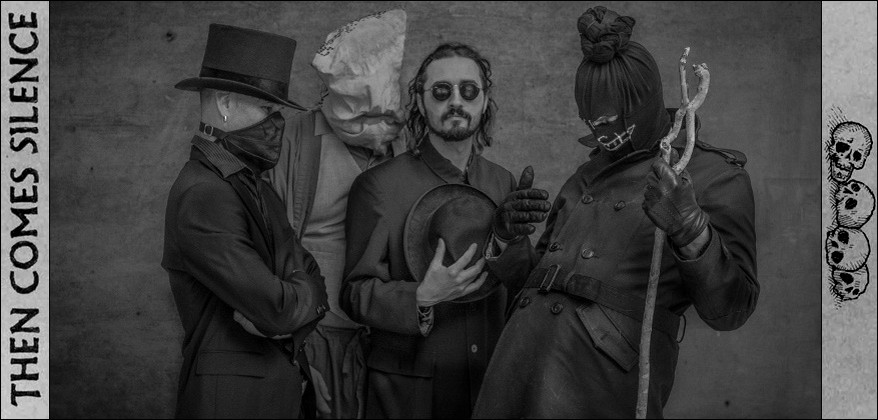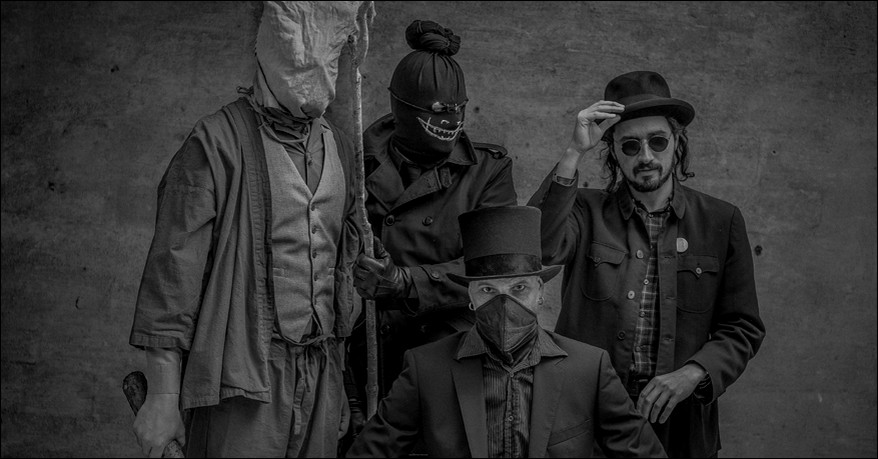MEET THE ARTIST: ALEX SVENSON (THEN COMES SILENCE) ABOUT "NYCTOPHILIAN"
 Hi Alex! Congratulations on your new album - a true masterpiece of post-punk music; such a dark-shining jewel. Seems as if this time, you are even more into the darkness than ever before, aren't you?
Hi Alex! Congratulations on your new album - a true masterpiece of post-punk music; such a dark-shining jewel. Seems as if this time, you are even more into the darkness than ever before, aren't you?
I’m honored, many thanks. Every Then Comes Silence album revolves around one or more distinct parts on the subject of darkness. The first album is mostly an apocalyptic piece about the inevitable death. The end of everything basically. A year after that we released the follow up album "II". A short description would be that it's essentially about leaving this place for another world. The journey.
With "Nyctophilian" I think it’s time to talk about the vicious minds and the evil deeds that lurks everywhere. It's been exposed a lot lately. The more you read about it the more it makes people suspicious. Evil is coming closer and fear becomes an effective tool.
"Nyctophilia" is a term that describes someone who loves the night and the darkness. So do you? What is so adorable about the darkness?
I love darkness! I also get shit-scared when I have to cross a dark hallway, a garden by night or walk thru a night black forest a long way from a safe lamplit home. Darkness is multilayered and mystic.
It's a place where we keep our secrets. A place from where we reveal sour truth and spicy history.
The night is connected to darkness. It’s a natural and a common metaphor. Appreciating the dark or embracing the night can be a way to catharsis.
Darkness and night has something in common with the general idea of death as it is known as the "eternal darkness". Which relation do you have to death?
I don't reject the subject. I never push it away. However, it should be more accepted to talk about death. The western lifestyle, where our cultural values come from, is very much about avoiding the uncomfortable presence of death and normalizes the fear of it. I try not to let it apply to me. Of course it hurts losing someone you care for, but maybe you shouldn't let sentimentality and sorrow blind you.
How often are you now confronted with death and does it have affect on you?
Except for the time I spend on music, my ordinary everyday is mostly spinning around in an orbit of my family and kids. I'm not frequently confronted with death. Not more than any other guy. But, I do think about death everyday. I live right next to a cemetary and I appreciate it. I have a strong interest in the matter.
When I was twenty and something I used to work at a hospital in the geriatric section taking care of the old on their last stop. It's always sad when they passed away, but it seemed like a relief to them.
I held my grandmothers hand when she died. Holding her hand and "sending her off" was a strong and emotional experience. She meant very much to me and her warm love made me the person I am today.
The "Nyctophilian" cover shows the well-known ouija-tablet for the "moving wineglas" ritual. Do you believe in the possibility of communicating between the dead and alive?
I want to believe there's so much more than this. If we want to, we can make things happen. There's a spiritual world. But then it's up to you how you want to describe it and how you want to deal with it. Is it fiction or a parallel dimension? A world of ghosts dressed in Victorian fashion or a natural force rumbling in the ground and in the nature? You decide.
If there was the possibility to talk with a specific dead person of your choice, which one would you interview, and why?
Wow, if I could I would like to talk to a lot of dead people. Everything from dead relatives to unknowns. I'm not so sure they would feel the same way about me, though.
Ludwig van Beethoven is fascinating. I've read his biography, but there should be more particulars around his private life and his philosophy. He's often portrayed as the grumpy and lonely hard working genious. He cogently kept it as a secret that he started to lose his hearing at early age. A misfortune that would have destroyed his career if it came out. He kept it a secret for a long time. He rarely noticed when someone greeted him. That might have created the rumours about his testy personality. A lonely life with hardly any life partners and a reputation as a harsh musical teacher was a result of that tragedy.
I would like to hear his thoughts and understand how he managed working til he completely lost all of his hearing.
When I listened to "Feed The Beast", it strongly reminded me of "Alabama Song (Whisky Bar)" from the Doors as this terryfing jumping organ sound has the same character in my eyes. Are they somehow also some of your idols or inspirations?
You’re right about "Alabama Song". The song is a reflection of typical Kurt Weill themes from his "Stück mit Musik" works. His music reflected the nasty zeitgeist by that time in the late 1920’s and early 1930’s. His music certainly angered his enemies. The big part of "Nyctophilian" is spinning around wickedness. There are frightening extreme movements around the world today. It's more obvious and clearer now than ever. Regarding The Doors, they are one of my personal top 5 favorites. They are certainly the first "Gothic" band. Long before the term "Gothic" was used in rock music. I want to borrow the Kurt Weill mood for "Feed The Beast". A sense of the decadent "cabaret", "vau de ville" and spinning carousels. The song can be understood as an impression of ignorance, evil and indifference.
When I wrote "Feed The Beast" I was a bit inspired by the D.A.F. sound who I adored as a teenager. There’s no MIDI used on the recording. I set the old synthesizer on a sequenced loop and Karl, the drummer, just followed the tempo. Quiet simple and old style.
The album takes off with the energetic "strangers" and ends with "all strange". So is there a connection between these two framing songs?
They were both written at the same time. I think they pretty much cover the same story.
Both songs are about fear of the unknown. A bad dream, or a bad trip with people you don't feel safe with.
In my opinion, this album is very much stronger and also clearer in its concept. Was it your declared goal to make a so to speak "simple" album with straight songs?
The two previous albums are a bit more chaotic and noisy than the last one. That was my intention. I think the mashed sound of a scew balance between hi and low frequences and the turbid multi-doubled instruments creates the feeling of an unsafe and scary story. Those songs share a colder atmosphere. I like it cause it helps to boost that feeling. The apocalyptic and ghostly feeling.
With "Nyctophilian" I want to see what’s hiding in the shadows of the sinister mankind. Not so much about the ghostly and eeire things like the other two albums. Human behaviour is central here. The vicious and the violent human behaviour. That would also have to change the sound of the music.
There is this common saying that the third album is the most difficult one as it decides whether a band will have the strength to keep on going in music biz or not. Did you also share these feelings of wanting to create something long-lasting and more remarkable than ever before?
There's some truth in it, but we don't have a big machine with resources behind the band. We use the same tools as the last time and rely on the new song material and the live performance. I have more songs coming up. I can start working on new recordings anytime. We have that artistic freedom and that's OK.
Did the production of "Nyctophilian" differ from the first two albums?
Yes, this production is recorded differently. This is not a "Wall-Of-Sound" kind of album. On the previous ones I recorded the guitar riff more than ten times, layer on layer. This album is way more clearer and we focus on less tracks and fewer takes.
Your Sound clearly carries on the spirit of such great 80s-Post-Rock-Bands such as Killing Joke or Bauhaus. Unfortunately, this type of music has become very rare in these days. How do you see the current Gothic Scene? Is it quite "Gothic" or more "dark folklore", as I feel it from time to time?
I don't know really. To be honest I don't listen much to new gothic bands. I will improve and I will become a better listener. I like that the scene has got a wide range.
You will play some gigs this year, especially in Germany. Do you have more fans here than in your home country?
Last time we played in Germany we felt there was a good connection with the audience. The majority of our buyers on our bandcamp site come from Germany. Maybe you are more into Goth than the Swedes. Back home we're stuck in the generic DJ-never-ending-techno-party hell. At least the majority are. They reject darkness and keep dancing the fear away.
|| INTERVIEW: DANIEL DRESSLER | DATE: 07/03/14 | CONTACT || [READ IN GERMAN] || ["NYCTOPHILIAN" REVIEW] >
Website
thencomessilence.bandcamp.com
THEN COMES SILENCE PHOTOGRAPHY © ANDREAS KARPERYD.
READ MORE IN ENGLISH? HERE ARE SOME EXCLUSIVE INTERVIEWS TO ENJOY
Andi Harriman & Marloes Bontje, Authors of the 80s Postpunk/Goth Compendium, "Some Wear Leather, Some Wear Lace"
Sophie and Marianthi of Marsheaux talk about their recent Depeche Mode Tribute, "A Broken Frame"
Paul Anstey (Bloma) on how Marijuana, Paranoia and Creativity fuelled his studio work
Matt Howden (Sieben) talks about his RASP project, a recent collaboration with Jo Quail
<< HOME || KEEPING UP WITH UNTER.TON? MEET US ON FACEBOOK >>
© ||UNTER.TON|MAGAZIN FÜR KLANG- UND SUBKULTUR||
